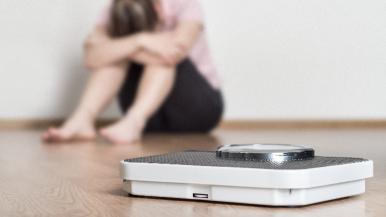Eating disorders are among the deadliest mental health conditions, claiming 10,200 lives each year.
And the misconceptions and stigma surrounding eating disorders — that only women have eating disorders, for example, and eating disorders are a lifestyle rather than a serious medical condition — hinder many people’s decision to seek help.
“Eating disorders are very serious,” says Joyce Corsica, PhD, director of outpatient psychotherapy and director of bariatric psychology at Rush. “It is important that people who are suffering get the help they need.”
Corsica and Molly DePrenger, MS, RD, a clinical dietitian at Rush, share the unique challenges people with eating disorders face and provide ways to cope.
Defining eating disorders
Eating disorders are complex and affect all people, regardless of race, ethnicity, gender, sexual orientation and socioeconomic status.
“It doesn't matter if you meet the full criteria for an eating disorder,” Corsica says. “What matters are the behaviors — if you are routinely engaging in uncontrolled eating and or compensatory behaviors, like misusing laxatives, compulsive exercise, fasting and or self-induced vomiting. That’s when it becomes a problem, and it’s time to seek help."
These are the most commonly known eating disorders:
- Anorexia nervosa, characterized by weight loss, restrictive eating behaviors and difficulties maintaining an appropriate body weight based on your height and age.
- Bulimia nervosa, characterized by a cycle of binge eating and purging (laxative use, self-induced vomiting and/or compulsive exercising).
- Binge eating disorder, characterized by repeated episodes of eating large quantities of food and feeling out of control. This can be followed by feelings of guilt or shame.
- Eating disorder not otherwise specified, more commonly known as disordered eating, which can include a number of irregular eating behaviors, such as repeatedly overeating when bored, depressed or stressed; skipping meals; or restricting a major food group, like fats or carbohydrates. Often, disordered eating can lead to a specific eating disorder.
Effects of eating disorders
Eating disorders can affect your emotional, mental and physical health, and if not addressed, they can lead to major health concerns or even death.
All eating disorders can be related to depression, anxiety and other mood disorders. In fact, studies show up to 20% of those who have anorexia nervosa attempt suicide and up to 60% of those with eating disorders engage in suicidal thoughts and behaviors.
And eating disorders can affect every organ system in your body — including your cardiovascular, neurological, gastrointestinal and endocrine systems.
Depending on the specific type, eating disorders can be associated with the following health complications:
- Heart failure
- Cardiac arrhythmia
- Anemia
- Kidney failure
- Pregnancy complications
- Electrolyte imbalances
- Acid reflux
- Inflammation and rupture of the esophagus
- Diabetes
- High cholesterol
- High blood pressure
- Heart disease
- Gallbladder disease
- Osteoarthritis (reduction of bone density)
- Sleep apnea
The influence of social media
Social media has become a significant trigger for people struggling with their eating habits. Corsica notes that social media can influence people’s emotional functioning, their relationship with food, physical activity and body image, especially through social comparison.
DePrenger adds that recently many people and companies are posting on social media about how comfort foods and alcohol, or extreme exercise routines, are part of coping with stress. The reality, however, is actually quite different.
“Often, partaking in those eating behaviors or extreme exercise routines does not result in what we have been promised by many brands, companies and influencers, and can be followed by a sense of guilt or shame,” DePrenger says. “This messaging can be really confusing and stressful for someone with an eating disorder.”
Healthy ways to cope
The facts are clear: Millions of men and women are struggling with an eating disorder or disordered eating habits — and the numbers are growing.
Our experts suggest the following healthy coping strategies for people with disordered eating habits:
- Recognize when there is a problem. Identifying the issue can be the hardest part of an eating disorder. Some of the physical and emotional signs can include weight fluctuations, being preoccupied with weight, food, calories and body image, performing food rituals, withdrawing from social eating events and activities, and feeling out of control.
- Identify what your body needs. If you are struggling to stick to your structured mealtimes, check in with your hunger cues (stomach growling, low energy and problems focusing) and be honest with yourself about what you are feeling, so you can address what you really need in that moment.
- Keep a journal. A journal can be a good outlet to express your feelings and can help you identify what you are experiencing. Refer back to your journal when you are struggling with triggering thoughts or situations.
- Reframe your thoughts. When trying a new coping strategy, remind yourself in the moment that you are working to better your health and well-being.
- Create a list of activities. When it’s not mealtime, try new activities to help care for your mind and body. Activities can include taking a walk, talking on the phone with a friend, journaling, organizing your home or engaging in healthy exercise, such as yoga or meditation.
- Don’t be afraid to change your environment. Some places in your home, such as the kitchen, can be triggering. Try changing your environment, so you are more comfortable throughout your day, particularly when it’s not a mealtime.
- Identify your support system. Find people who make you feel safe and supported during your journey with an eating disorder or disordered eating habits. Consider joining a virtual support group with people who can relate to your food concerns.
- Reach out for help. Seeking help is important and sharing your experiences can contribute to your progress and others. Don’t be afraid ask for help — it could save your life.
If you or someone you know is struggling with an eating disorder or disordered eating, contact your primary care provider or call the National Eating Disorder Association Hotline at (800) 931-2237, which is available 24 hours a day, seven days a week. For emergencies, call 911.




